Barna has issued new survey results that paint a stunning picture of the bellwether United States, as an utterly confused, conflicted nation, with 88 percent defaulting to incongruous worldview components, with the single largest bloc being 39% inclined to “Moralistic Therapeutic Deism.” Of course, actual full adherence is at the 1% level. Biblical theism comes first on full adherence, at 6% but that is itself a radical shift of worldviews, probably reflecting the impact of generations of cultural elites hostile to the Gospel and Gospel ethics (most often articulated in terms of its being anti-Science, outdated and intellectually indefensible . . . the standard media and “education” narratives). Such elites have long since sought to overthrow the influence of the Christian Faith on our Civilisation, viewing it as a threat to their imagined ideal future.
Barna tabulates actual adherence:

Also, “leans to”:
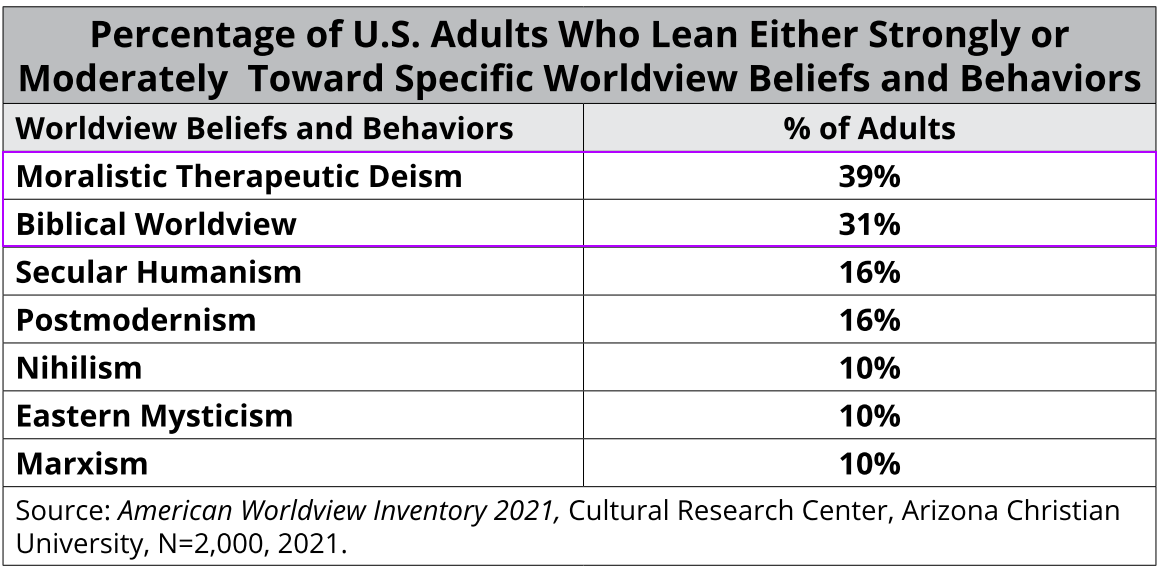
We can clearly detect the breakdown of the impact of the Christian faith on the leading nation in our civilisation and the worldviews chaos that stems from it. The predominance of incongruous syncretistic, smorgasbord blends of beliefs shows how deeply conflicted people have become and it is for sure that the ability of such a people to think straight and act soundly is severely compromised. This is the crooked yardstick effect on steroids:

In political thinking, it clearly will lead to vulnerability to cynical, ruthless manipulators, thus to confused policy balances. This opens the door to the new Jacobinism on the rampage, thus the next door — the one to lawless oligarchy:
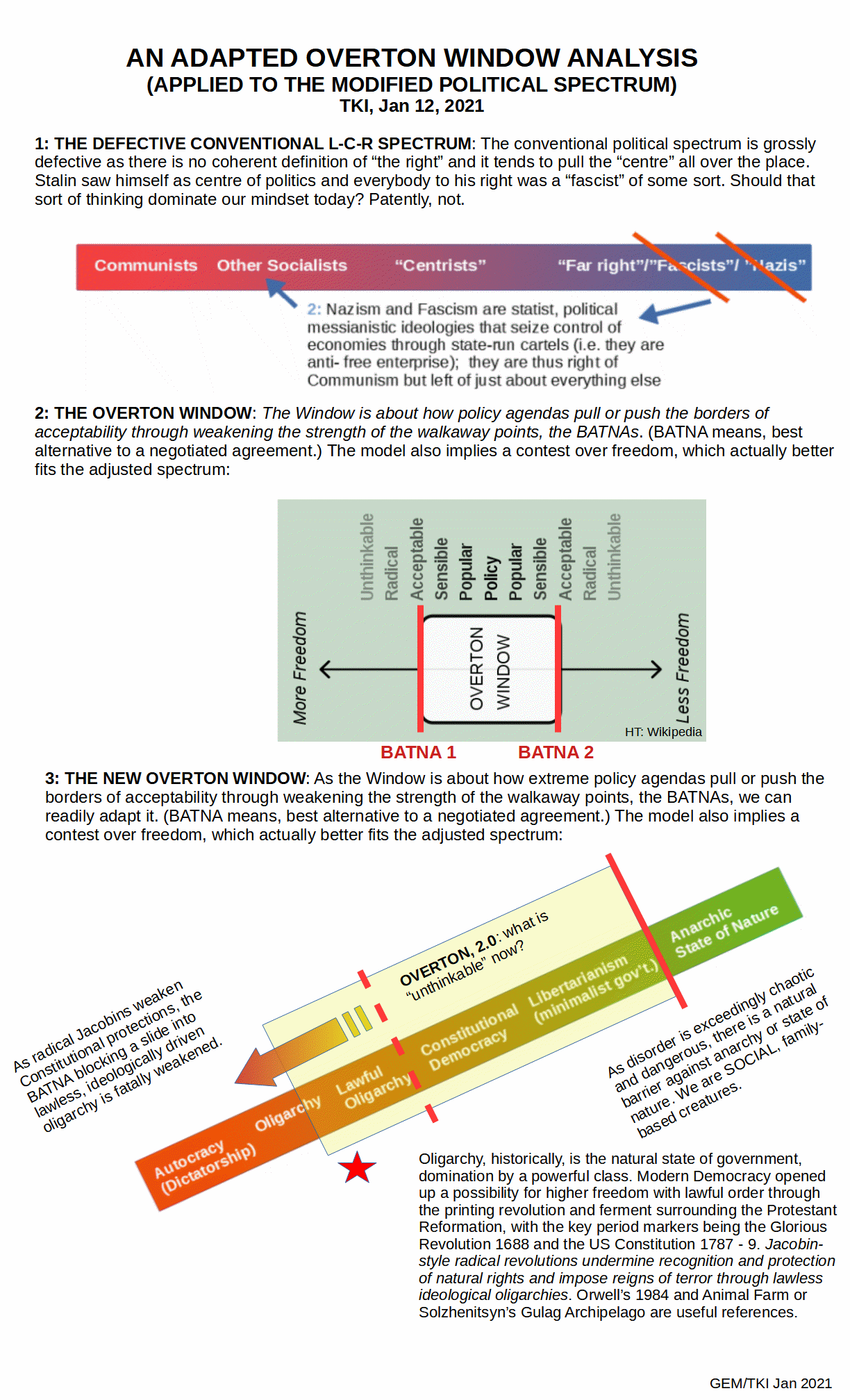
Doubtless, there are some who would be only too eager to see such happen, as it would open the door to terrible opportunities — and yes, that’s five years ago now:
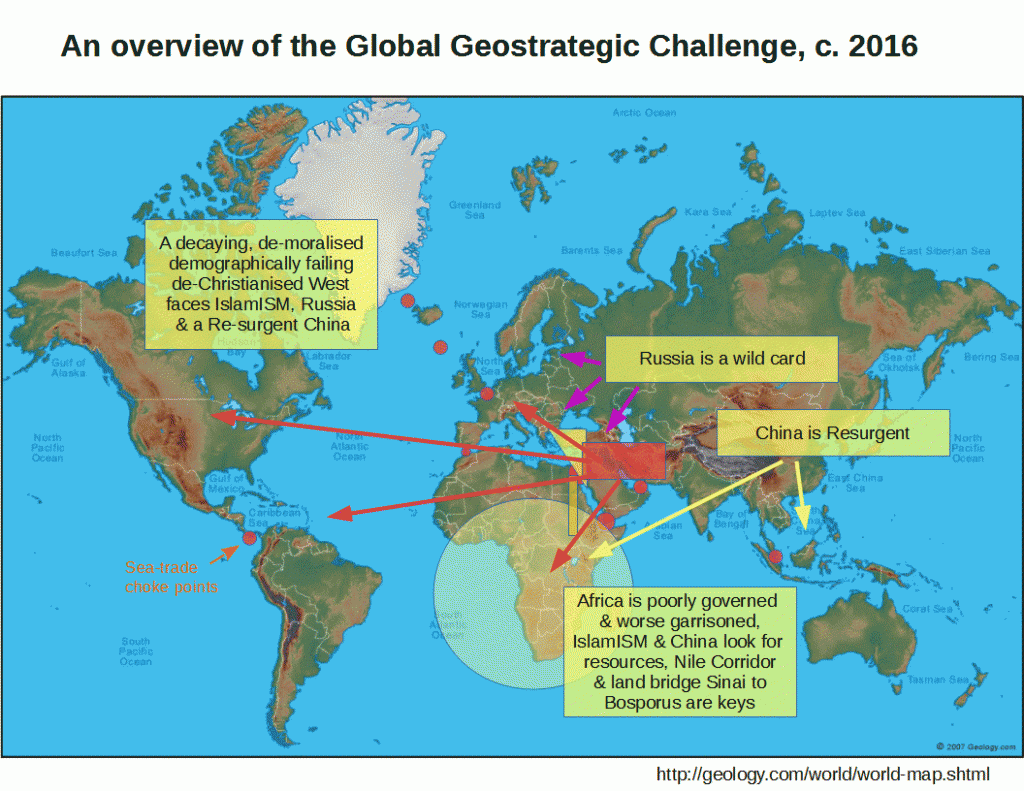
What is to be done?
First, let us hear the ghost of Isaiah, speaking to hell-bent oligarchic elites c 700 BC, setting out on marches of folly that led to defeat, ruin and exile:
Isa 5:18 Woe to those who draw iniquity with cords of falsehood,
who draw sin as with cart ropes,
19 who say: “Let him be quick,
let him speed his work
that we may see it;
let the counsel of the Holy One of Israel draw near,
and let it come, that we may know it!”
20 Woe to those who call evil good
and good evil,
who put darkness for light
and light for darkness,
who put bitter for sweet
and sweet for bitter!
21 Woe to those who are wise in their own eyes,
and shrewd in their own sight!
22 Woe to those who are heroes at drinking wine,
and valiant men in mixing strong drink,
23 who acquit the guilty for a bribe,
and deprive the innocent of his right!24 Therefore, as the tongue of fire devours the stubble,
and as dry grass sinks down in the flame,
so their root will be as rottenness,
and their blossom go up like dust;
for they have rejected the law of the Lord of hosts,
and have despised the word of the Holy One of Israel. [ESV]
Severe but necessary.
A key step in fixing the rot is to learn to think worldviewishly, in a coherent, sound, prudent, responsible fashion.
Vocab:
worldview
Also found in: Thesaurus, Wikipedia.
world·view
(wûrld′vyo͞o′)n.1. The overall perspective from which one sees and interprets the world.2. A collection of beliefs about life and the universe held by an individual or a group. In both senses also called Weltanschauung.
[Translation of German Weltanschauung.]American Heritage® Dictionary of the English Language, Fifth Edition. Copyright © 2016 by Houghton Mifflin Harcourt Publishing Company. Published by Houghton Mifflin Harcourt Publishing Company. All rights reserved.
Welt•an•schau•ung
(ˈvɛltˌɑnˌʃaʊ ʊŋ)
n. German. a comprehensive conception or image of the universe and of humanity’s relation to it. [literally, world-view] Random House Kernerman Webster’s College Dictionary, © 2010 K Dictionaries Ltd. Copyright 2005, 1997, 1991 by Random House, Inc. All rights reserved.
To start with, ponder why we frame worldviews pivoting on first plausibles:

In the now notorious “turtles” metaphor:
So, the pivotal question is sound worldviews choice, meeting the comparative difficulties challenge: factual adequacy, coherence, balanced explanatory power. Hasker [Metaphysics. IVP, 1983. Ch. 1] summarises how such comparative difficulties testing properly focuses:
- Factual adequacy: Does a worldview’s scope of explanations/insights (and predictions) account across time for and comfortably agree with the material “facts”– those that make a difference to our conclusions and decisions? Are there key gaps, and/or contradictions to such “facts”? Are these claimed “facts” warranted to an appropriate degree? Relative to competing worldviews, are there fewer gaps and/or contradictions to such credible, well-warranted “facts”? But also, sometimes, quite diverse views are empirically equivalent, so “facts” generally under-determine the truth. That means that the two further tests are vital:
- Logical Coherence: Do the claims within a worldview (and their implications) support or deny one another? For, if two such claims/implications contradict, at most one can be true. (NB: Both may be false, or may refer to empty sets and so are vacuous. If a contradiction is important and cannot be excised without utterly changing the worldview into something else, this issue can be decisive. That is why the problem of evil is so important, and why the question of the evident incoherence of naturalism is also important, as has been ably discussed by Alvin Plantinga.) On the other hand, is the worldview’s key warranting argument merely circular; i.e. is it self-consistent, but at the cost of assuming what should be proved? However, on pain of absurd infinite regress, it is also manifest that the chain of proofs, explanations and evidence has to stop somewhere. So, is the resulting faith-/ presuppositions- point at least comparably credible to that of “live option” alternatives? Now, too, as systems rub up against alternatives and more and more credible facts, they are often “patched,” over and over, to keep them “viable,” i.e. matching facts and avoiding circularity or self-contradiction. But, too often that is at the expense of becoming a patchwork of ad hoc assumptions. Thus, the third test arises:
- Explanatory Power — i.e. simplicity vs ad hocness: Credible worldviews UNIFY the facts/entities of reality as we discover them across time, showing how they relate, interact and/or work together; thus, giving us powerful insights, clear vision and solid, sustainable guidelines/principles for thought, decisions and life. [Cf. Prov. 1:1 – 7.] This helps equip us to know, love and live by, wisdom — the ultimate goal of philosophy. In turn, wisdom allows us to understand, predict and influence/shape the world, to the good. To do that unifying task well — as William of Occam argues, in his famous “Razor”: hypotheses should not be multiplied without necessity — worldviews should use a relatively few, plausible but powerful core beliefs that are consistent, tie together the material facts, bring out the dynamics that drive how the world “works,” and give us “handles” by which we can influence the course of events towards the good. Thus, such a worldview should avoid the continual need to patch newly discovered gaps by repeatedly tacking on yet another assumption or assertion. For, if that happens, the resulting view soon becomes an ad hoc patchwork of after-the-fact claims, “justified” by the argument that these additions patch holes in the system. (Ignoring or suppressing such gaps and/or censoring discussion of them is even worse — and, too often resorted to by those whose credibility and interests are invested in a socially powerful but failing system. Cf. Plato’s Parable of the Cave, and also Matt. 6:22.) But equally, Einstein aptly observed that every theory should be as simple as possible — but not simpler than that. That is, there is a difference between being simple (or, “elegant”) and being simplistic: failing to come to grips with the credibly established complexities — and sometimes just plain strangeness and mystery — of the world. So, relative to the live options, is the view more or less elegant or an ad hoc patchwork; or, is it simplistic?
That is where we can begin. Just maybe, it is not already too late. END
PS: I adapt Francis Schaeffer’s “line of Despair” analysis:
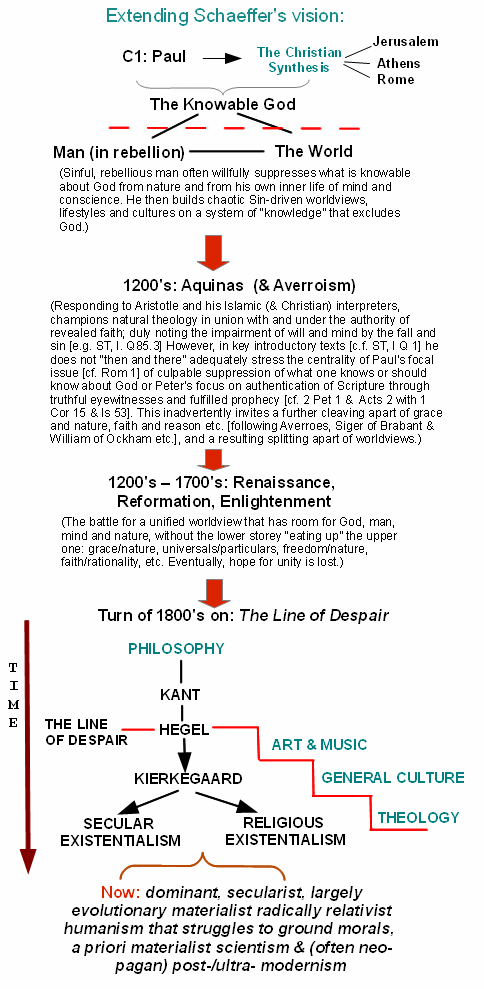
U/D Apr 24: An illustration on factors and influences in worldview formation:
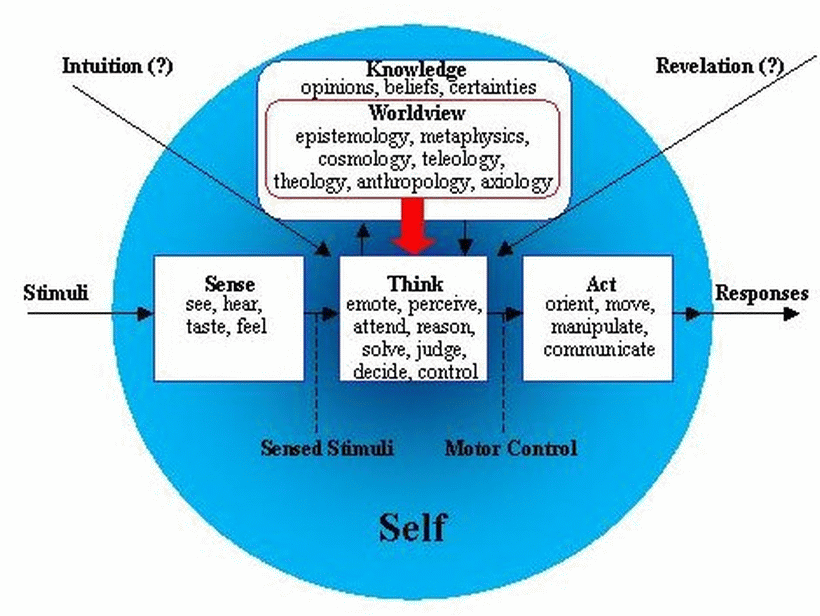
Here, we can observe how our perceptions stimulate our thinking, which is also influenced by available knowledge, opinions and views including on key themes tied to core ideas on the world and oneself in it. As we work through our interior lives, we have perceptions, expectations, emotions, focus of attention, reasoning/logic, valuing informed by sense of duty/morals, solution strategies for challenges, discernment, decisions and judgements, actions and influences. As embodied agents in a world and community, we orient ourselves, move, manipulate objects, communicate.
Knowledge and its warrant are key issues, raising questions of reliability, credible truth, degree of certainty, possibility of error, opinion vs soundness and more. Such is a gateway to characteristic themes of philosophy:
- the nature of knowledge and its credibility [epistemology]
- the nature of reality — what exists, whence, what is the world, what are we etc [metaphysics embracing ontology, logic of being],
- the accepted “world story” that uses these elements to build a narrative on how the world came to be or always was, how we came to be in it, how we are where we are now, why we are as we are
- similarly, where are we headed individually and collectively
- what death is and signifies
- what is ultimate or source reality, or does such exist
- what is duty, what of right and wrong, what of beauty [axiology, ethics and aesthetics]
- what, then, is valuable and to be prized
- thus, religions, philosophies, ideologies, mindsets etc and associated “plausibility structures”:
“In sociology and especially the sociological study of religion, plausibility structures are the sociocultural contexts for systems of meaning within which these meanings make sense, or are made plausible. Beliefs and meanings held by individuals and groups are supported by, and embedded in, sociocultural institutions and processes.” [Semantic Scholar, using Wikipedia]
- what is seemingly or actually sensible, reasonable or logical [logic, plausibility, epistemology, ethics etc]
- what is knowledge, what is known, why, who or what hold credibility, authority and wisdom, why should we trust such sources [epistemology, logic, language, decision-making, governance, policy, law and justice, politics, ponder Plato’s parables of the Cave and of the Ship of State (cf. Ac 27 as a real-life microcosm)]
- Hence, we may see the significance of the following progression of equations:
1: WORLDVIEW + POLICY/CULTURAL AGENDA = IDEOLOGY
2: IDEOLOGY + POWER/STRONG INFLUENCE = REGIME
3: REGIME (AKA, BALANCE OF POWER-FACTIONS) + DECISION-MAKING INFLUENCES = BUSINESS AS USUAL (BAU)
_______________________________________________4: BAU + INSISTENT VOYAGE OF SINFUL FOLLY = SHIPWRECK
- what makes for a good and successful life
- is there direct awareness of knowledge, i.e. intuition
- is there knowledge communicated from God, revelation
- etc
These help us to understand how we come to have a worldview. And, of how and why, in Francis Schaeffer’s phrase, “ideas have consequences.”
It is worth adding, that once a certain pattern of worldviews, associated patterns of attitudes, expectations, values, life goals etc is established, this model can help us identify the likely reaction to situations, trends, shocks, messages, communication etc.
So, worldviews mapping as Barna did has highly practical use.
